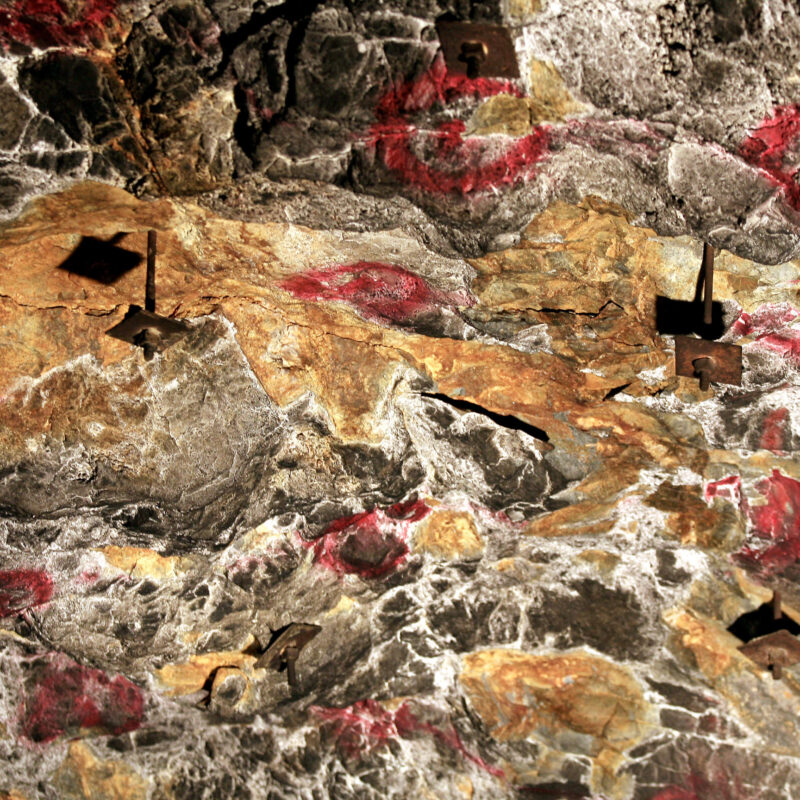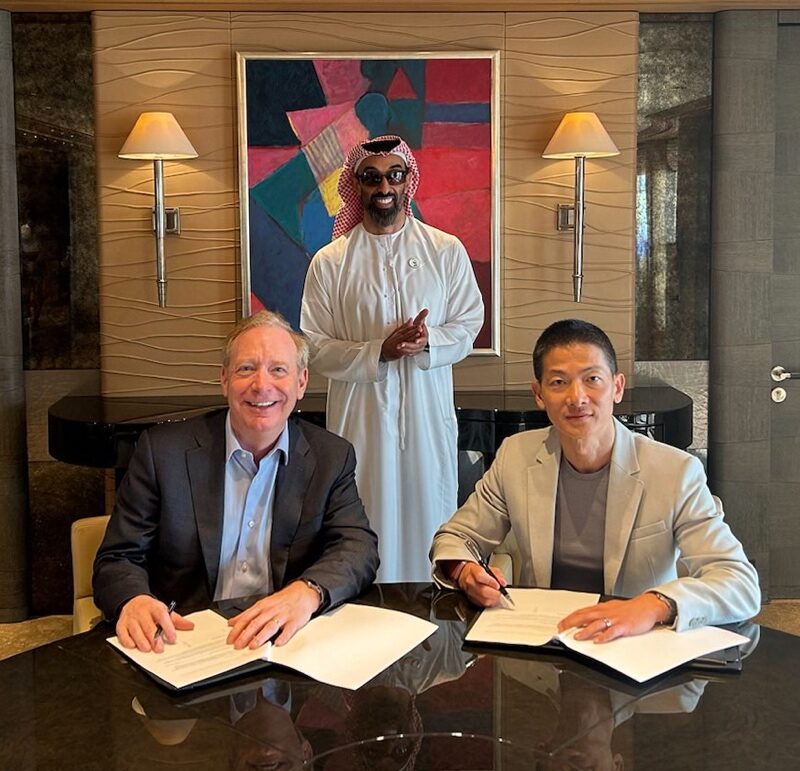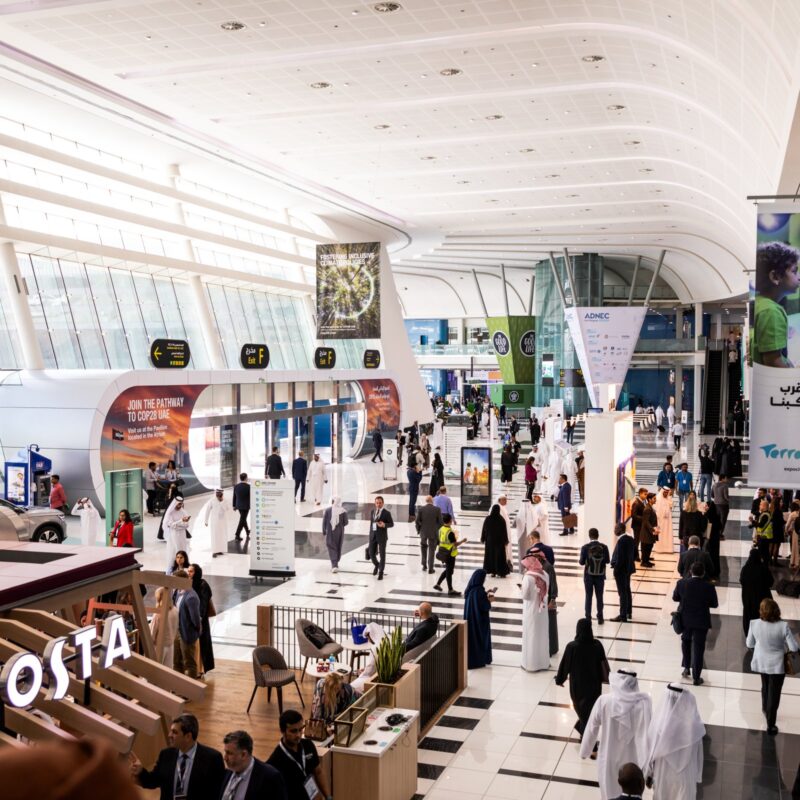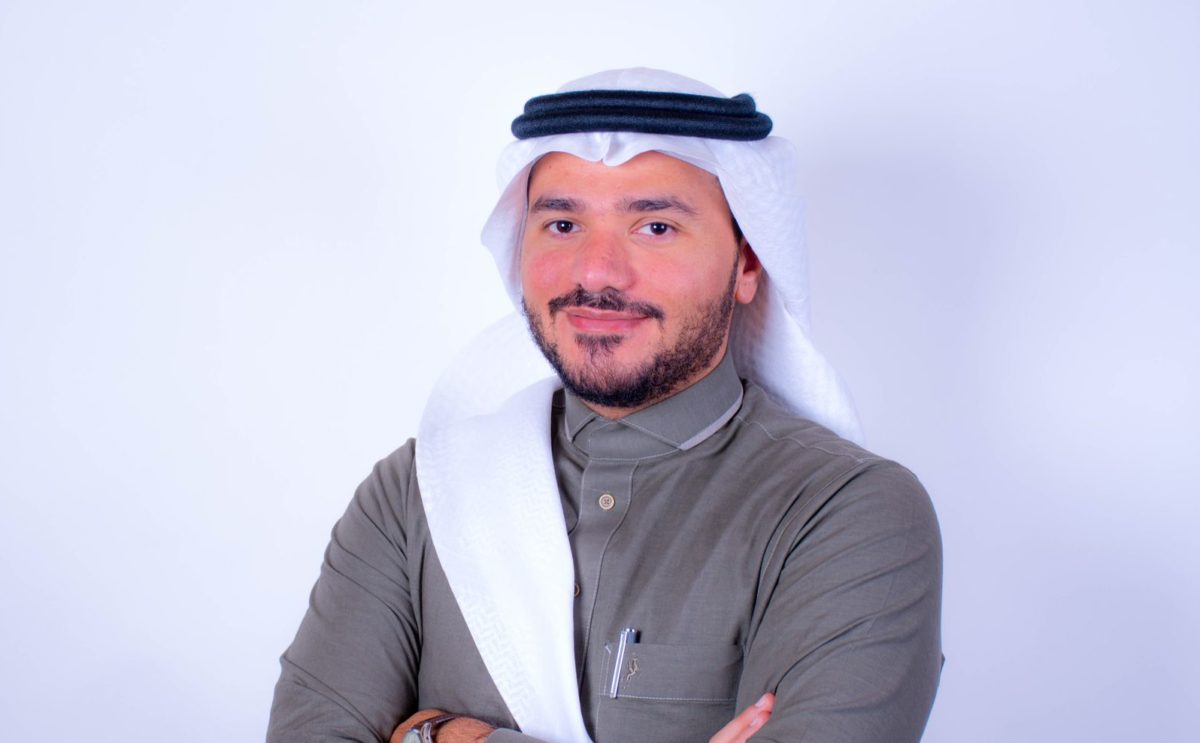
Courtesy
The Arab influencer pushing the Abraham Accords from Abu Dhabi
Loay Alshareef’s people-to-people bridge-building has given the Abu Dhabi resident a potentially powerful platform
At the age of 28, when Loay Alshareef, then a French language student from Saudi Arabia, stumbled into his homestay in Paris to discover he was surrounded by Stars of David — his instinct was to turn on his heels and find another family to stay with. “I didn’t feel comfortable at the beginning,” he told The Circuit.
Putting it mildly, Alshareef said he “didn’t have positive views about Israel or about the Jewish people,” at that time, in 2010.
“I called the school and they said ‘take your time’” — and with the gentle guidance of his “wise” host mother, he did.
That accidental and intimate almost year-long encounter with a Jewish family proved to be a turning point for Alshareef, an observant Muslim, whose father is originally from Egypt and who also has family from Bahrain, which he described as “a very nice mix.” Alshareef grew up in a middle-class household in Jeddah with his brother and sister.
Today, he is a prominent face among movers and shakers in the region who have embraced the Abraham Accords, normalization deals signed in September 2020 between Israel, the United Arab Emirates and Bahrain, and are working to strengthen people-to-people ties between those countries and beyond. He’s caught the attention of Israeli, U.S. and Gulf leaders, and frequently meets with prominent figures visiting the UAE, where he has lived since 2020.
Alshareef owns a PR company in Abu Dhabi and works with both governmental and non-governmental entities, and also teaches English and Arabic. He has also learned Hebrew, largely from watching TV and listening to songs and podcasts, which he readily explained to The Circuit in the language. Prior to moving to the UAE, Alshareef lived in Bahrain, and spent a couple of years in the U.S., where he earned a master’s degree in software engineering from Pennsylvania State University.
He hasn’t yet visited Israel, but hopes to do so when the COVID-19 situation isn’t so rife — he’s waiting to visit his mother back in Jeddah for the same reason. Ultimately, he strives to get an academic degree in Israel and study the history of the Dead Sea Scrolls, further embracing his love of Biblical Hebrew which he describes as “very authentic and very deep.”
He said that while he appreciates the focus on Israel as a startup nation, “the history of Israel itself is also a beacon in our world and deserves to have more attention to it.”
Alshareef’s initial U-turn toward Jewish-Arab understanding wasn’t a sharp one, but a gradual process. “I was going through an inner struggle,” Alshareef recalled in a Zoom call from Abu Dhabi. “And this change wasn’t easy, but I really wanted it.”
Having been raised in a country where anti-Israel and antisemitic messaging was imbued in him, integrating into a Jewish home opened his eyes, his mind and his heart.
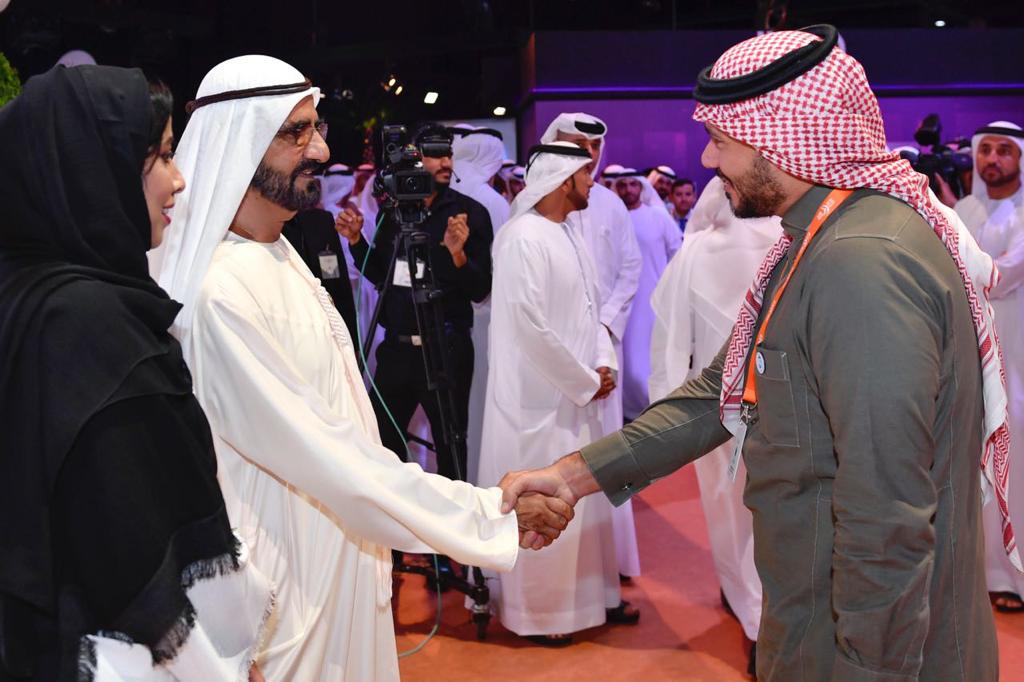
Loay Alshareef shakes hands with Dubai ruler Sheikh Mohammed bin Rashid Al Maktoum at the Arab Media Forum in 2018.
“When I engaged more and more with them [the Parisian Jewish family], it changed lots of negative views,” he said.
It took courage, he said, to leave “the herd,” among whom hatred of Jews was the norm.
“There are good Jews, bad Jews, good Christians, bad Christians, good Muslims, bad Muslims — but this is not what we were taught. We were told that the Jews are conspiring against Muslims and the Jews are evil, the Jews hate Muslims from the bottom of their hearts. And to me, it was very baffling.”
Being a history buff, reading the Bible was a significant element of Alshareef’s transformation. As he studied, he began to understand the connection of the Jewish people to the land of Israel.
“The Bible is all about the story of the relationship between Israel, the people of Israel and their neighbors, and the people of Israel and God. So when you dig deep into it, you start to realize how connected the Jews are to this land and why this land specifically, and from the times of Joshua bin Nun entering the land to the times of the Maccabees taking control over Judea, you get to know the real history of Israel,” he said. “And then you start to believe in the legitimacy of the Jewish belonging to the land of Israel, or to the land of Canaan.”
Today, Alshareef is fully invested in building bridges between Jews and Arabs, but understands the inherent challenges in doing so. “You cannot blame” people, he said, for “being taught for 70 years hatred towards Jews and Israel.” Today, he noted, Saudi Arabia is undergoing a “great change,” leaving behind previous education curricula that he described as “disastrous.”
Marcus Sheff, CEO of The Institute for Monitoring Peace and Cultural Tolerance in School Education (IMPACT-se), pointed out that 15 of the hijackers in the September 11 attacks grew up in Saudi Arabia, as did Osama bin Laden.
“There is a clear and direct link between school education,” Sheff told The Circuit. Changes to the education system were slow in coming but in recent years, he said, there has been an institutional effort for change and “there is a clear strategic approach to modernizing the curriculum.”
IMPACT-se has been monitoring the curriculum since 2003, and on an annual basis since 2019, when they presented a report and a list of examples of necessary changes to Saudi Arabian authorities, after which significant changes were made. The organization has seen the removal of “a great deal of content” that demonized Jews, Christians and non-believers and promoted violent jihad.
“Ideas which forbade friendships with Jews and Christians have been taken out, which is what we see now — the Saudi effort to do business with the outside world,” he added. “You can’t do that if you forbid relations with them.”
Alshareef promotes such relations through social media videos, which he shares with his 180,000 followers on Twitter and 38,000 followers on Instagram, as well as educational and face-to-face encounters.
He said he often responds to questions about how relations can be friendly now with Israel after leaders in the UAE used to express negative sentiments towards the Jewish state. “I always say this answer: You have to know that in politics, circumstances change. And when circumstances change, you have to adapt with this. Israel, we saw it as a threat, to be very honest. In the first creation of Israel, it was viewed as a threat. Time proved that Israel is part of the region and wants to blend with its neighbors. It never poses a threat. The country that really poses a threat to us is Iran.”
Alshareef also uses his social media platforms to promote and defend the UAE. Ahead of the launch of Expo 2020 in Dubai, he posted a video on social media pushing back against a European Parliament resolution calling on member states not to participate in the event due to human rights violations by the country.
“Human rights is all about protecting individuals and groups against discrimination and providing, without ommissions, healthcare, education and human dignity, and that is all encompassed in the UAE,” he said.
Since 2016, when he started traveling to the UAE, he developed a love for the country.
He found the UAE to be “ahead of everyone else” in its “openness and acceptance of others.”
“It’s a metropolitan country, we have different cultures, different sects, different religions, different people, and the harmony that they are living and they feel that they are accepted is phenomenal to be very honest,” he said.
“I speak with knowledge and with evidence and I always say that my ultimate goal is to bring Jews and Muslims together. So for that sake, if I have haters, that’s fine.”
“So I believe me and the UAE, we have the same agenda. The same agenda of accepting, the same agenda of embracing other cultures and other people and especially when it comes to Israel — after the Abraham Accords, I would never be able to live in a Gulf state better than the UAE.“
He wouldn’t be able to engage in the same peace-building activities with Israelis in Saudi Arabia, he said, because there is not yet the same acceptance of Israel among the people as in the UAE. “They will accept when the time is right,” he added.
He has been branded a “normalizer,” a “Zionist wannabe” and the like. “But Saudis are changing, to be very honest, to the better, to more accepting of the fact that Israel is part of our region, the Jews are indigenous to the land of Israel and this is what I’m trying to say to people.”
Alshareef accepts that he is met with some online backlash.
“I speak with knowledge and with evidence and I always say that my ultimate goal is to bring Jews and Muslims together. So for that sake, if I have haters, that’s fine.”
Alshareef and other like-minded influencers have been holding joint gatherings — such as Shabbat meals — with Jewish community members, and have celebrated both Jewish and Muslim festivals as a group.
Rabbi Levi Duchman, the first resident rabbi of the United Arab Emirates and head of Chabad in the UAE, who has engaged Alshareef in various Jewish community activities in the UAE, first met him in 2018, when Alshareef was living in Bahrain. “I was super impressed by his knowledge and by his enthusiasm of learning about other cultures, about building bridges and about learning from each other,” he told The Circuit.
“I am proud of this courageous relationship with Loay, and all the other young Arab youth that have been playing a very instrumental role in bringing different cultures and traditions together,” Duchman added. “I think it very well resonates with the warm welcome our community has very gratefully received from UAE leadership, together shaping a very bright future.”
Rabbi Yehuda Sarna, chief rabbi of the Jewish Community of the Emirates, described Alshareef as the “consummate cultural translator.”
He first met Alshareef in 2018 when he joined the Jewish community for a service in Dubai — “One of the few non-Jews who attended in those years,” Sarna told The Circuit. “We opened up the Torah to show him our scroll and he started reading. It happened to be [Torah portion] Yitro — as he read aloud he exclaimed, ‘The ten commandments!” Sarna recalled.
He added that this past November, at the Abu Dhabi Forum for Peace gathering, Alshareef was quoting freely from Jewish prophets “and applied them seamlessly to contemporary situations.”
“He sees the potential connection between people and lies over the divide to bridge them,” Sarna said. “He has no fear except the fear of being untruthful to himself and his principles.”
“I want to open a new page of Muslim-Jewish relations, and I will do whatever I have to do for this reason,“ he said. “I believe the Abraham Accords are here to stay and will flourish — I hear people saying they will survive — I say they will flourish.”
Alshareef also meets with Jewish organizations working in or visiting the country. Last week, together with fellow regional peace activists Saoud bin Hamoodah and Majed Alseyabi, Alshareef joined a roundtable hosted by the American Jewish Committee for an interfaith group of undergraduate students visiting from the U.S.
Reva Gorelick, program director for AJC in Abu Dhabi, said Alshareef’s contributions to the discussion, during which he spoke about the importance of personal identity, “underscore his genuine and passionate support of Israel and Muslim-Jewish relationships, and his demonstrated commitment to the ongoing dialogue about and in the aftermath of the Abraham Accords.”
Alshareef says that he is seeing people changing their perspectives before his very eyes, and that is what keeps him motivated.
At the Expo, for instance, many of his Saudi friends had the opportunity to interact with Israelis. “They liked how the Israelis are open to them. One of them told me, ‘I didn’t feel that I’m speaking to an enemy.’ Because we were told for 70 years you are the enemy. And so it will not change overnight. But with these continuous efforts and struggle, it will change, inshallah,” Alshareef predicted.
“I want to open a new page of Muslim-Jewish relations, and I will do whatever I have to do for this reason,“ he said. “I believe the Abraham Accords are here to stay and will flourish — I hear people saying they will survive — I say they will flourish.”
